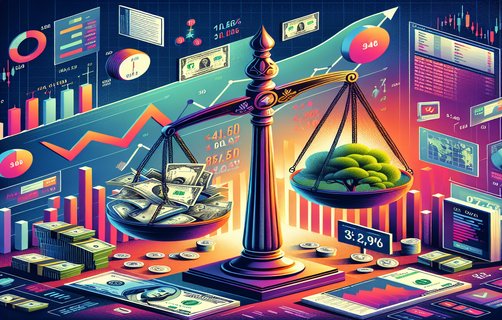
In a world where silicon dreams intertwine with human ambition, the workplace of tomorrow is already taking shape. The rhythmic pulse of AI innovation disrupts conventional paradigms, urging organizations to rethink every facet of their operations. Amid this cybernetic symphony, both challenges and opportunities emerge in a dazzling interplay of technology and talent.
As AI permeates every stratum of business, the narrative shifts from uncertainty to a dynamic arena where human ingenuity meets digital precision. The frustration of outdated processes and the allure of automation's promise trigger a rebalancing act not unlike navigating negativeodds in high-stakes endeavors. In today's digitized business environment, strategic fundallocation is critical—ensuring that technological investments yield unprecedented returns while safeguarding against the inherent highrollervolatility of innovation.
One cannot help but marvel at the innovative spirit driving this metamorphosis. Traditional roles are being redefined, and new positions are emerging that blend creativity with technical acumen. Employers are increasingly leaning on automation to tackle routine tasks, freeing human capital for roles that require empathy, strategy, and nuanced decision-making. Yet, lurking in the background are challenges—fears of splitbetting on technology investments that may not always pay off, concerns about job displacement, and the occasional unpredictable 'freespins' moment that disrupts even the best-laid plans.
Industry experts have weighed in on this transformation. Dr. Lena Grant, an authority on AI ethics and automation, argues, "Automation is not the enemy; it is an invitation to reimagine our work. When we harness its potential mindfully, we unlock creative reservoirs and usher in a new era of problem-solving." Her research at the Institute for Future Work highlights that companies integrating AI with human oversight experience fewer operational inefficiencies while enjoying enhanced employee satisfaction.
In parallel, research from the Global Automation Initiative reveals that businesses embracing AI-driven solutions are not only optimizing costs but also reinventing the customer experience. They are using innovative algorithms to predict market trends, thus mitigating risks associated with negativeodds while capitalizing on opportunities that were previously unfathomable. This dual approach—balancing algorithmic precision with human intuition—has been particularly transformative in strategies related to fundallocation and risk management.
The contemporary workplace is also witnessing an evolution in leadership dynamics. Instead of viewing AI as a tool to replace human effort, forward-thinking executives are championing it as a collaborative partner. This cultural shift emphasizes the symbiotic relationship between human creativity and machine efficiency. As firms navigate the labyrinth of digital transformation, the challenges are clear: safeguarding against cyber threats, ensuring ethical data usage, and maintaining a workforce that is both adaptable and resilient.
However, these challenges are balanced by groundbreaking opportunities. Imagine a world where employees are empowered to engage in more fulfilling, strategic roles; where AI handles the mundane, leaving the truly human—innovation, leadership, and empathy—to flourish. This is the promise of a future where dynamic risk models, akin to splitbetting strategies, allow businesses to experiment without fear of catastrophic failure, turning volatility into a playground of creative risk-taking.

This transformative period is not simply about replacing one set of tools with another; it is a holistic revolution that redefines the very notion of work. Companies are now exploring innovative compensation models and flexible work arrangements, integrating AI into decision-making processes while ensuring ethical guidelines are upheld. By fostering environments where ideas can spin freely like freespins in an unpredictable digital slot, organizations continue to adapt and thrive.
To engage deeper with this paradigm shift, consider the following interactive questions:
1. How can your organization best prepare for the AI revolution without compromising human creativity?
2. What measures should be implemented to balance AI innovation and ethical concerns in daily operations?
3. In the context of fundallocation, how do you perceive the balance between risk and reward in an AI-driven workplace?
FAQ:
Q1: Is AI a threat to job security in the modern workplace?
A1: While there are concerns about displacement, AI primarily reallocates human talent towards more strategic, creative, and high-skill roles, reducing monotony and enhancing job satisfaction when implemented responsibly.
Q2: How can companies ensure ethical use of AI in decision-making?

A2: Companies can establish comprehensive AI governance frameworks, invest in continuous training for their teams, and work closely with policy-makers and ethicists to create transparent and accountable practices.
Q3: What role does AI play in improving operational efficiency?
A3: AI streamlines mundane tasks, analyzes complex data sets for better decision-making, and allows companies to predict trends more accurately, ultimately driving down costs and boosting overall productivity.


Comments
Alice
This article brilliantly captures the nuanced dance between technology and human ingenuity. It really makes you rethink what the future of the workplace might hold!
小龙
真的很有见地!把AI的挑战和机遇讲得既深刻又容易理解,迫不及待想看到更多类似内容。
Rafael
I especially appreciated the discussion on fundallocation and risk management. The concept of 'splitbetting' in decision-making is fascinating!
佳佳
文中关于AI如何改善工作流程的描述非常实际,有助于企业重新思考未来的战略规划。